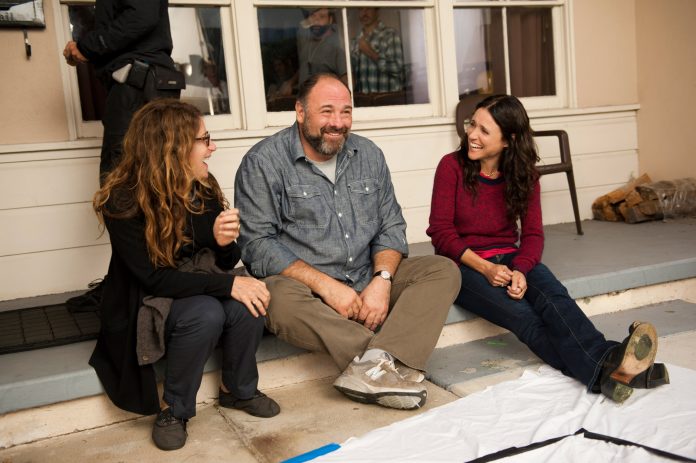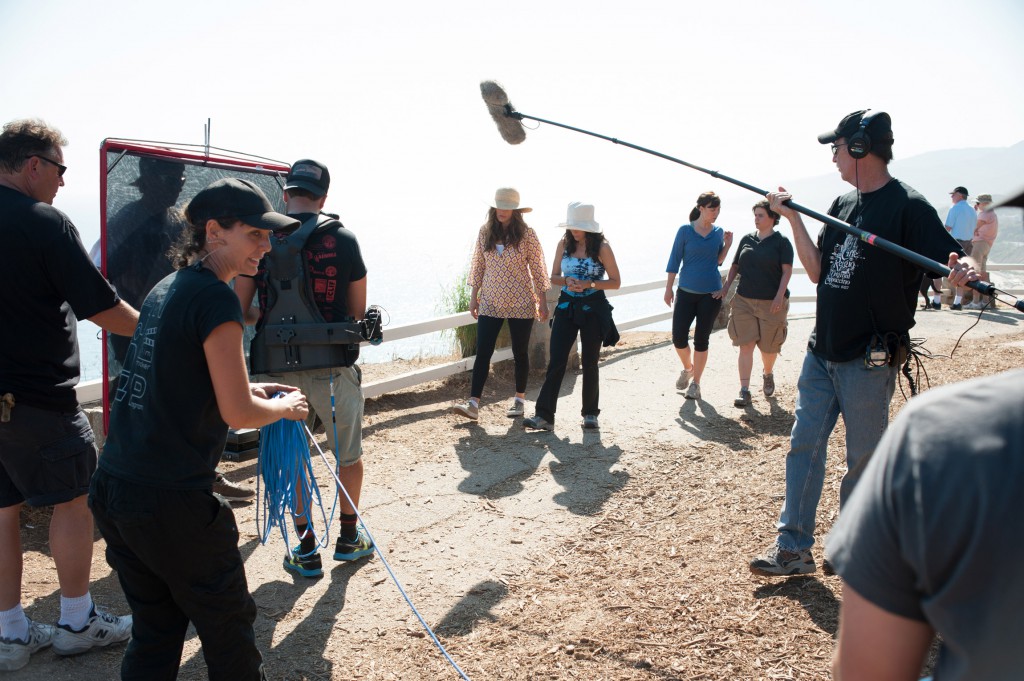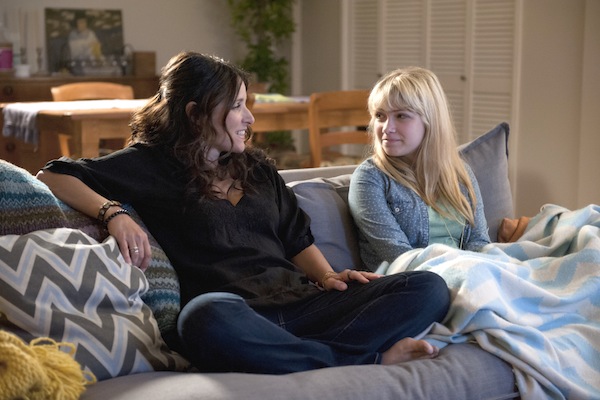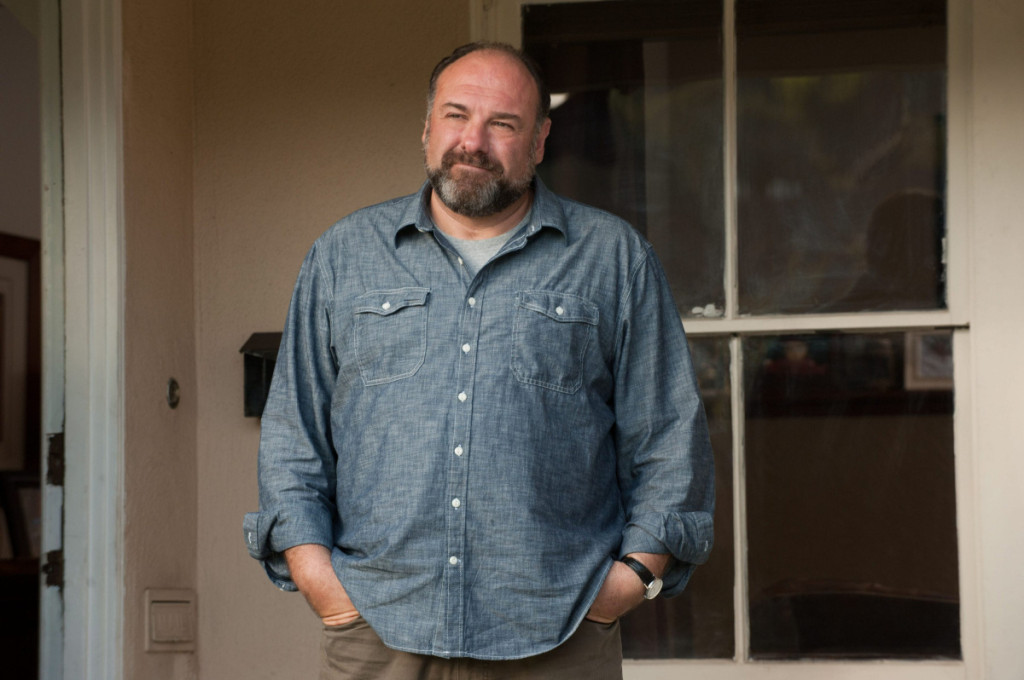
Nicole Holofcener (left) on the set of Enough Said with James Gandolfini und Julia Louis-Dreyfus © Fox Searchlight (2013)
I was lucky to interview the acclaimed indie director Nicole Holofcener about her newest and most successful film Enough Said. Though the most talked-about aspect of the film seems to be the late James Gandolfini (who passed away so unexpectedly earlier this year), the film’s qualities go far beyond just featuring a one of the final performances of a great actor. It’s a funny, occasionally touching and always very natural portrayal of relationships – romantic and otherwise. Holofcener’s filmography might not be the most productive (five films in 17 years), but the quality goes well above quantity here, with her delivering gem after gem. In fact, every single of her films managed to score nominations at the Independent Spirit Awards. Enough Said might be her most accsssible film, which would explain the success and yet it always feels as true and genuine as her other works. "Genuine" is also how I’d describe the person that I interviewed in what turned out to be one of my most pleasant interviews in some time.
Filmfutter: First of all, I’d like to congratulate you on the nominations that Enough Said received at the Independent Spirit Awards and personally thank you for creating one my most pleasant cinematic experiences I’ve had this year.
Nicole Holofcener: Thank you. You are very welcome. (laughs)
FF: What compelled you to write Enough Said? Did you or someone you know closely have any similar experiences to those portrayed in the movie?
NH: No. It’s just…the themes and the characters have been floating around in my head for a while. Being in a relationship after having been divorced, having kids, who are going away to school soon – those were just the themes and thoughts that were prevalent in my mind. Thankfully I don’t know anybody that behaves as immaturely as Eva (Julia Louis-Dreyfus’ character). It was all made up.
FF: You have been making films for a long time now, but Enough Said has become your biggest commercial success. Do have any idea why it crossed over into mainstream audiences more than the other ones?
NH: Well, I do. Of course, you can do your best to do a mainstream movie and it could still flop. I wanted to challenge myself and make a more mainstream movie to get a bigger audience, but not feel like I was selling out. I wanted it to still have my voice in it. It has much more of a traditional plot that can be advertised, so that more people would say: “Oh, that’s not just a bunch of people talking. There is something going on!”
FF: Do you find it difficult to always find the right balance between comedy and drama in a way that it still feels natural?
NH: I don’t have a hard time with that. I think they both go together so beautifully. This movie has no tragedy in it, so that it can balance comedy and drama in a way that they exist in life. You’ve gotta be able to laugh at your problems, though of course some of your problems you can’t laugh at. I’ve got an intuitive approach and I try to trust my taste and my judgment, when I think: “Okay, we can laugh here”. If anything, I sometimes take out laughs or funny moments, when I think I might be bordering on inappropriate. Other than that, I don’t really struggle with it so much.
FF: You might be aware that often comparisons arise between your films and those of Woody Allen. Do you see these comparisons as a compliment of sorts or do you think they miss the bigger picture or goal that you have?
NH: I don’t really have a goal. I think of that as a compliment. I mean, I grew up loving Woody-Allen-movies. I’m sure he influenced me along the way. Many other filmmakers did as well. I personally would rather choose not to be compared to anybody. I don’t think that’s a good way to go. But if I am going to be compared to someone, I’ll take Woody Allen.
FF: You worked on some of his earlier films, right?
NH: Yeah, I was the production assistant and apprentice editor on one of them.
FF: Speaking of Woody Allen’s work – so far you have also only directed your own screenplays. Would you consider bringing someone else’s script to the screen?
NH: Yes, I would. I came very close a couple of times. I would love to, I just haven’t found a script that I love enough or I’m just not being sent the scripts that I’m going to love enough and want to devote a year of my life to. I hope that after the success of Enough Said I will get more opportunities and will be sent more wonderful material, so that I don’t have to write all my own films. (laughs)
FF: Do you have anything lined up next?
NH: Not really. I don’t have a script of my own. I want to start writing. I might make a pilot for HBO, but that’s still up in the air. So, no, I’ve got nothing. You’ve got something for me? (laughs)
FF: Well, maybe a little vacation is nice too.
NH: Yeah. I think that sounds good.
FF: I think a very neat idea in the film was having James Gandolfini’s character work at the old television shows archive. I know that you have done some work in TV as well. I’ve been wondering, what current shows are you watching?
NH: I like “Girls” a lot. I just watched the Sarah Silverman HBO special… I’m still watching “The Sopranos”, getting to the end. I’ve never watched the whole series.
FF: Oh, me too, though I’m just starting the third season. Brilliant show.
NH: It gets better and better. I still watch “Seinfeld”. I love “Parcs and Rec” and “Enlightened”, the shows that I worked on.
FF: Would you like to direct an episode of “Girls” yourself?
NH: Sure, I’d love that.
FF: How does the process of conceiving your characters work? Is it beholden to what you put on page or do you allow transformation once a character is matched to a specific actor, say, Julia Louis-Dreyfus?
NH: I can’t say the characters change that much after I write them. I mean, the essential character doesn’t change, but any actor will certainly alter the vibe of the character, how they say things, how they embody them. That’s a great part of the process, I love it. Then I can’t really remember whom I had in my mind when I wrote it because that actor then seems like the only person who could play that character. We change lines, improvise and adlib along the way, but the essentials stay the same.
FF: Do you usually picture someone when writing your screenplays?
NH: The characters are kind of like shapeshifters. Sometimes I picture a certain actor and then I picture a different actor. When I’m writing, yeah, it really helps to find the character’s voice or if it’s an actor that I’m hoping to work with. Obviously, I have worked with Catherine Keener a lot and sometimes I picture her saying the lines because I know she’ll be playing the character. Or at least I hope she will.
FF: You have worked with Catherine Keener on every single of your films so far. How did that working relationship come to be?
NH: In a pretty traditional way, actually. I saw her in a movie called Johnny Suede, at the Sundance Film Festival and I just fell in love with her immediately. So I tracked her down and her agent set up a lunch meeting for us. I sent her the script for Walking and Talking (Nicole Holofcener’s directorial debut), she liked it and we met. We hit it off immediately. She said she wanted to do it and it has been a real struggle to get it made for six years. We have stayed friends ever since.
FF: Did you at some point consider her for Eva (now played by Julia Louis-Dreyfus)?
NH: No, I didn’t and she knew it. As I was writing it, I really wanted to work with someone else – literally, just for the change. I thought it would stretch me as a writer and a director. Also, Catherine has played parts before in my movies that were somewhat similar to Eva, kind of an insecure mess. I thought it’d be more interesting for both of us for her to play Marianne.
FF: Let’s talk about Julia Louis-Dreyfus then. She hasn’t starred in live action movies for over a decade. How did you get the idea of casting her? Did she have any hesitations about going back to movies as the rhythm of making a TV show is different from that on a movie set?
NH: She did not hesitate. I had long lists of actors, both male and female, that the studio and I were going over for a very long time. Eventually, I guess, she read the script through her agent and called my agent to meet with me because she would love to be in this movie. I didn’t know if she’d be right for it. I’ve never met her and I’ve only seen her on her television shows. She was brilliant in them, I was a huge fan, but I wasn’t certain enough to just offer her the part. When we met, then I became certain. She was just so…”Eva” and related so much to Eva and her plight that I wanted her to take the part right after that. She did not hesitate at all; I think she was hungry for a fleshed-out character and to play drama, which she obviously did beautifully. But she also brings the comedy with her. She makes the film so much funnier than I could have ever imagined, but the fact that she could also play the dramatic aspect so beautifully, that’s a gift.
FF: Looking at the characters or Eva and Marianne – who do you personally find it easier to relate to?
NH: Eva, absolutely. I feel like a part of me is Eva. I don’t think I would ever lie to the extent that she lies or betray the person I’m in love with, but everything else I kind of relate to – her personality, the way she walks, the way she talks, the way she feels about her daughter going away to college – that’s totally me.
FF: Though it fits the character, she does behave childishly at some points…
NH: Completely. I’m sure I’m childish too, but not in a big way. I can’t keep cookies in the house and stuff like that. (laughs)
FF: And then there is of course James Gandolfini… I’m sure there has been barely an interview for this film that passes without a question about him and though you’ve probably just known him for a few months, do you sometimes get the feeling that people that talk to you, expect you to know him better than you actually did and to have more insights about him than you actually do because it was one of his last films?
NH: That’s very astute of you. It’s very strange to be placed in this position because I knew him at the end of his life and it was only for two months. I’m not the last word on James Gandolfini. I knew him so briefly. It almost seems like it’s so intimate…
FF: In some of the interviews that I have read, it seems like the interviewers expect you to have some final insights in him
NH: I know! And I was just one person along the very long career that he had. I’m thrilled that I knew him, I’m thrilled that I worked with him and I’m very sad that he’s gone.
FF: It is a huge loss and what a tremendous performance he delivered in the film.
NH: Oh, thank you.
FF: It’s unlike most parts that he played, maybe except for the role he played in Welcome to the Rileys, which features another one of his calmer, more down-to-earth performances.
NH: I watched that one before I cast him. I knew he could play many different characters, but I wanted to see it for myself and I thought that performance was lovely. It gave me more confidence.
FF: Did he jump on the role immediately or did he have any hesitations?
NH: If he had hesitations he didn’t share them with me. He read the script right away; we met about it right away. I think every actor, when they accept the part, waits to see what the initial rehearsal is going to be like. They want to make sure that I’m not a total nutjob and they want to make sure that they like their co-star and that I like them together. Once we saw that we were going to have a good cooperation, everybody was in all the way.
FF: One thing that interests me – I loved the movie, but some of my colleagues thought the ending was too happy, whereas I see it more as “optimistic” rather than flat-out “happy”. I’d compare it to the ending of Alexander Payne’s Sideways. He (Paul Giamattis character in Sideways) knocks on the door and that’s it. What’s your take on it? Does Enough Said have a happy ending?
NH: It’s funny because some American critics see it as a downbeat and confusing ending, whereas the rest of the world doesn’t like clichéd endings. I guess I think of it more in terms or optimistic and hopeful rather than happy. We don’t know whether their relationship is going to survive, but they are going to try. She learned her lesson and he does forgive her. So I guess in that way, it is a happy ending. It’s funny because the movie studio was afraid that it’s too vague and I was saying: “C’mon! Vague? They say that they miss each other. There is nothing vague about it.” In a traditional romantic comedy they’d kiss, they’d go in the house, he’d propose or whatever. (laughs) So tell your colleagues that they’re wrong! (laughs)
FF: What advice would you give to someone who’s constantly trying to find small flaws in the person they have a relationship with and trying to change and shape them at will?
NH: That’s a good question that I could use a good advice on myself. Because I write about it, doesn’t mean that I’m any wiser. It is important to see the big picture. One must acknowledge that everybody has incredibly irritating habits, myself included. But it’s not worth losing a wonderful person over. And stop picking at the person you love. I’m trying every day.
FF: Always a struggle?
NH: Yeah, it is. I’d say. Don’t you think?
FF: Definitely. In a way, relationships are always a struggle, though it doesn’t mean that every struggle is negative.
NH: No, certainly not. It’s a challenge to grow. You know, when you’re 21 you might think: “You know that guy wears really bad jeans, so I’m not attracted to him”. You kind of grow out of that and it doesn’t mean that you’re compromising; it just means that you are more mature. Jeans can be swapped out, but the person can’t be.
FF: Thank you for the interview and I hope your Indie Spirit awards nomination was just the first of several to come throughout the awards season.
_______________________________________________________________________











[…] l’humor Woody Allen. Una pel·lícula que segons ha explicat la directora i guionista en una entrevista: “el film parla d’estar en una relació després d’haver estat divorciat , tenir […]
[…] l’humor Woody Allen. Una pel·lícula que segons ha explicat la directora i guionista en una entrevista: “el film parla d’estar en una relació després d’haver estat divorciat, tenir […]